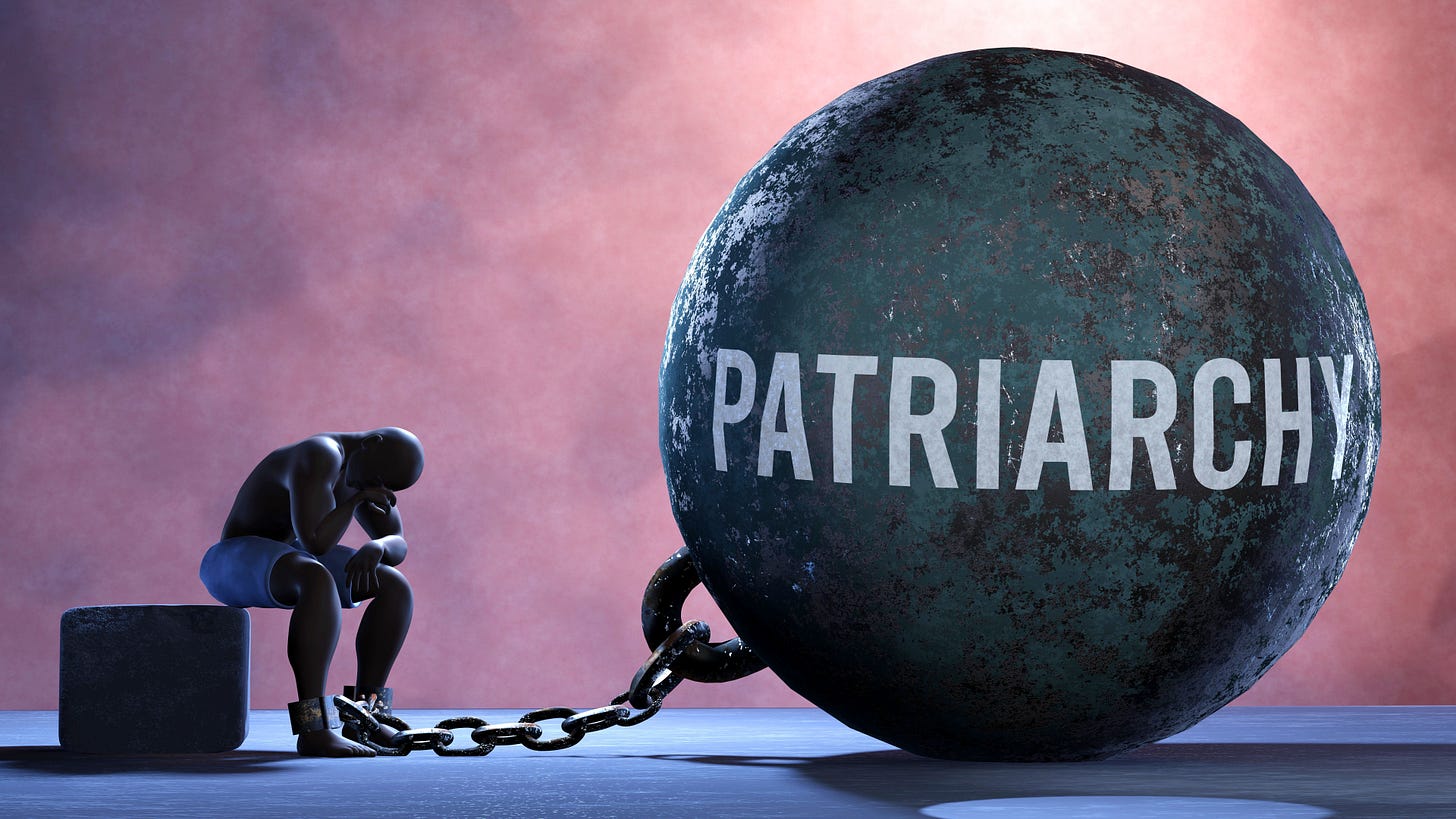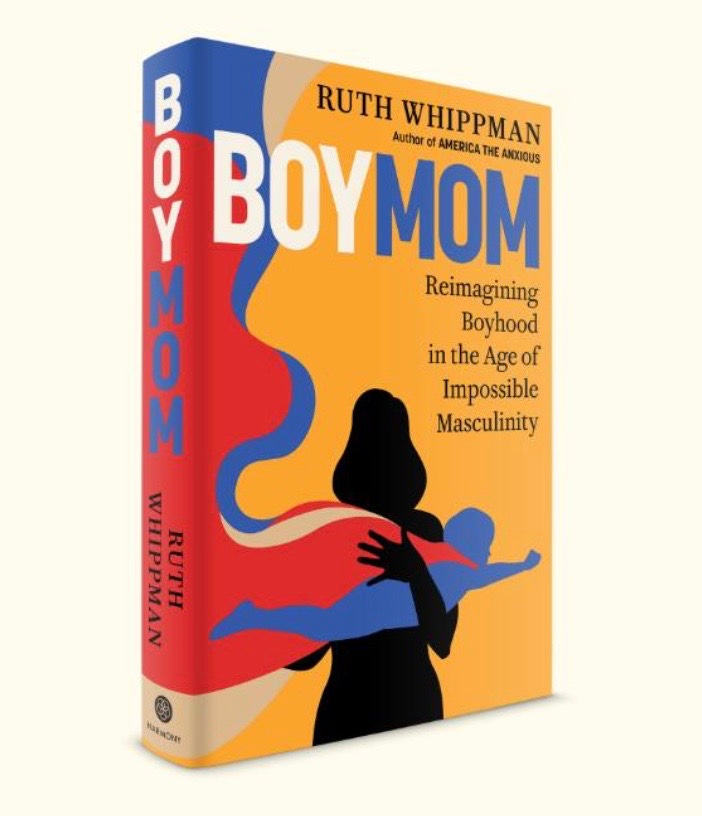Breaking Free: Boys and the Chains of Patriarchy
I'm definitely Team Girl but patriarchy is everyone's enemy
In graduate school I had the privilege of being a research assistant for the famous “Still-Face” experiment” with its creators, Ed Tronick and T. Berry Brazelton. This experiment was pivotal in showing that parental attunement is essential to an infant’s thriving and development. If you don’t know about the Still-Face Paradigm, I recommend you watch this three minute video, but beware, it’s momentarily heartbreaking.
The experiment begins with the parent interacting with and taking pleasure in their baby, responsive to the babies gestures and coos. Then the parent is instructed to become still-faced and stops responding to the baby. Instantly, the baby registers the loss of connection and attempts to re-engage the parent using the sounds and gestures that previously prompted a response. When the parent ignores her efforts and remains expressionless, we watch the baby become increasingly disorganized, shifting from happy and relational to upset and shrill.
As hope of reconnecting drains from the baby, she withdraws in confusion and anger, turning away from the mother so as not to experience more emotional pain. Thankfully, it only lasts two minutes after which the mother repairs the rupture in the relationship and we see the baby reengage with her, sometimes quickly, sometimes more slowly, which can be indicative of secure or insecure attachment, respectively.
We learn from the Still-Face Paradigm two key takeaways: 1) babies swiftly detect and react to changes in relational dynamics, and, 2) trust in relationships depends on realizing that ruptures can be repaired. It’s a fascinating study and provides deep insight into what happens when children go for long periods without attention and affection, such as in cases of parental neglect or depression. Children whose parents aren’t properly responsive to their needs have more trouble trusting others, relating to others, and regulating their emotions. That’s when long-lasting attachment problems are created – problems that extend beyond childhood and affect the person’s ability to form secure relationships later in life.
Of course, short bouts of ignoring children are common in everyday life when we get distracted by a phone call or because we’re cooking dinner or we just need a minute to decompress. That’s normal and likely even helps kids learn to tolerate frustration.
But, here’s something to consider in the context of parenting and attachment: there’s evidence that adults are generally less emotionally responsive to boys.
In our efforts to adhere to masculine norms, we unwittingly behave in ways we think will make boys strong. For example, we tend to ignore the sadness of baby boys more than we do baby girls’, picking them up less quickly when they cry and seeing their tears as angry. We also use competition-focused words with boys from a really young age and save emotion-focused language for girls. The irony is that by almost every measure, baby boys are physiologically and emotionally more vulnerable than girls. Indeed, some of the Still-Face research shows male infants had greater difficulty than female infants in maintaining affective regulation and took longer in repairing the rupture. Because of their relative immaturity, male babies actually need more nurturing and support compared to girls, but we give them less. This pattern of viewing them as tougher, stronger and angrier than baby girls and handling them more roughly continues throughout childhood. Over time, boys learn to renounce both their need for care as well as deny their own gentleness or kindheartedness.
This lack of access to or understanding of their feelings makes having relationships difficult and subverts the ability to repair ruptures in relationship.
It’s not, of course, just parents who reinforce masculine stereotypes. It permeates the culture. If you’ve been reading my newsletter, you know I’m very excited about the book, BoyMom, which was just released yesterday and I predict will fly off the shelves. I was able to read it in advance of the publication date and loved it because it delves into many of the challenges I've pondered as a feminist raising a son in today's world — a world of impossible contradictions, demanding a masculinity that rejects even the faintest whiff of femininity while viewing boys through the scary prism of #MeToo. I watch the male teenagers in my life spar verbally (and sometimes physically) with each other to see who can land the lowest blow. They laugh, shake it off, high five, show how tough they are. They’re having fun most of the time but that doesn’t mean they’re connecting in ways that allow for disclosing sadness and other vulnerable feeling. Boys on the whole are lonelier, more isolated, and spending more time on screens than girls and they’re dying by suicide at a rate of nearly four times their female peers.
BoyMom author, Ruth Whippman, argues we don’t teach boys relational skills like caring, connection, and cooperation because those qualities are associated with femininity and are, therefore, emasculating. She points out how little representation there is in books and the media for boys or men in relationship or friendship roles. Instead, they get stories about battles and winning. Sexism, she tells us, is hurting boys too. “Under patriarchy, boys get everything, except the thing that’s most worth having” —the deep human connection that makes the hardships in life bearable. She dives deep into the manosphere, interviewing incels and concludes that incel culture is "not an aberration, but perhaps the most extreme, but still logical, conclusion of many cultural, social, political and parenting threads in boy culture." Oof.
Whippman says we must do for boys what we’re doing for girls: show them that sexism is bad for them, too. Call out harmful expectations and assumptions around physical toughness, aggression, and invulnerability that make them feel vaguely but persistently inadequate. Referencing her sons, she writes:
I point out to them the glaring absence of boys in relational or friendship roles, to make the lack something that they are aware of. “Why are there no boys in this, do you think?” or “why do the boys not get to be friends too?” I’ll ask them about the Babysitters Club, or Ivy and Bean, or Lego Friends or Frozen, taking pains to pitch this as something desirable they are missing out on. “Don’t you think it’s sexist to assume that boys don’t have friends, or feelings?” I want them to have a sense of what they are missing, and a vocabulary to describe it, so they can spot these gaps too and call them out. To give them a language to understand their own experience.
We hear much more about the effect of bias and stereotypes on girls than on boys because girls are the ones who have been marginalized, who have less safety, autonomy, and opportunity. But boys clearly suffer too because of masculine stereotypes. The initiation into patriarchal manhood means disassociating from your feelings. Many of my patients, but boys and men in particular who are supposed to be stoic, feel ashamed of their feelings. Often, the only acceptable feeling for boys is anger. This lack of access to or understanding of their feelings makes having relationships difficult and subverts the ability to repair ruptures in relationship. As we saw in the Still-Face Paradigm, repair is crucial.
As with our daughters, we must allow for and be responsive to the whole spectrum of human emotions in our sons so they can remain connected to their feelings; so they can be sweet, silly, roughhousing, nurturing, ball-throwing, princess/superhero-loving, fart-joking, deeply connected boys. We need to raise boys differently not just to protect our daughters but to protect our sons.







The “Still-Face” experiment breaks my heart every time I watch it! I can’t imagine what it would have been like to work on it directly. Thanks for these insights. I see your points at play when I volunteer at my child’s elementary school. The friendship between the boys can be so surprisingly tender. And the ones who have the least self control seem to be most in need of a hug. Looking forward to reading the book🩷
I am so excited to read your book!